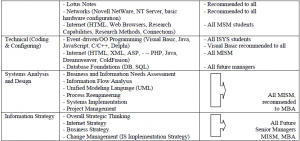Milen E. Marinov and Dr. J. Owen Cherrington, Accountancy and Information Systems
Being granted the ORCA scholarship I started researching information technology (IT) skills that will make a business student more marketable. I began my research at the end of November 1999. Gradually, along with demanded IT skills my research activity included the gathering and systematizing of information pertaining to the nature, existence, operation, and goals of centers for electronic business. The gatherings and conclusions I have made will be reflected in the mission and day-to-day activities of the Kevin and Debra Rollins Center for eBusiness @BYU. The eBusiness Center was established April 12, 2000. It is a product of extensive research and is designed to assist students and faculty in developing marketable systems skills.
The shift from an industrial society to information society has brought changes not only in the distribution of goods and services but also in the job market. The creation and subsequent use of new technology has lead to an increased demand for particular IT skills. Most of the recent revolutionary ideas and inventions have been taking place in industry, not at universities. With the advent of the information age the job market has assumed a more flexible, adaptive, and increasingly industry-driven nature.
The job market for information systems and computer specialists is very tight. The G7 countries are experiencing a growing deficit of computer savvy business people and computer specialists. Countries like Germany and the United States have expand their quotas for work permits, thus ‘importing’ skilled labor from developing countries, mostly India, Pakistan, and the former Eastern Bloc. Still, thousands of IT (Information Technology) positions remain unoccupied. However, we see and interesting paradox in companies like Ernst & Young LLP (a BIG 5) that let go more than 500 of its consultants. They had layoffs in one part of the company while experiencing shortages in another part of the company. We see this in the economy as a whole – layoffs in one section of the economy and shortages of labor in another?
The answer: major restructuring – an increasing need of IT skilled employees all across the board. Ernst & Young (E&Y) fired consultants who did not posses sufficient IT skills. What are some of the skills that might have helped those people preserve their jobs in E&Y and become more marketable?
I have identified four levels of IT skills. They are grouped under the categories of Application Proficiency, Technical (Coding & Configuring), Systems Analysis and Design, and Information Strategy. These four levels complement each other and are mutually non-exclusive. They represent the evolution of skill that will make any modern business student confident and any future student a desirable employee. The following table is a summary of marketable skills grouped by level:
![]()

The above levels of IT skills development are partially reflected in the Marriott School of Management’s curriculum. Every MSM student can take a class that will aid him/her in attaining skills in levels 1 and 2. The last two levels, although recommended to anyone, are a must for the graduate student in Management Information Systems. The most difficult to attain is the last level – Information Strategy. The Information Strategy level of skill and IT proficiency is characterized by a combination of strong business and IT skills. It cannot be attained without the knowledge of technology’s potential (programming skills and systems analysis skills) and without business skills (finance, strategy, intuition, market needs assessment, etc.). This last level is where all of the progressive management talent should be; it requires not only theory but also hands-on experience. The Level 4 individuals will have the ability to look into the future of technology and create revolutionary strategy. They will be shaping the modern image of any competitive US company.
Can a student barely graduating from college be placed in the Information Strategy level right away? IT is a way of thinking, a new philosophy; therefore it entails a new approach. Traditionally, technology was viewed only as a tool. That is why up until recently, an average Marriott School of Management graduate could not be placed in the top level. Not because the student did not possess the basic Level 1 and 2 skills but because he/she viewed IT only as a crunching tool and had limited hands-on experience in the creative field of finding new industrydriven uses of IT and the development of IT inventions. This, however, is changing. The Rollins Center for eBusines@ BYU will give business students the opportunity to be both witnesses of and participants in creating new technology. It will teach and promote the IT philosophy. The programs of the eBusiness Center will enable information systems students to gain experience in business-to-business commerce and all tactical and strategic issues associated with it. Furthermore, MSM students will have the opportunity to maintain a close working relationship with industry leaders. The eBusiness Center will facilitate research and practical work on reallife projects that deal with the latest technology. It will assist students in attaining the highest level of understanding of new IT solutions; thus, preparing them to become the future strategists of the new economy. With the help of outstanding faculty and thanks to close cooperation with industry, the Rollins Center for eBusiness@ BYU will be able to place its students at the doorstep of the Information Strategy Level.
This research would have been impossible without the professional direction of Dr. J. Owen Cherrington, Director of the Kevin and Debra Rollins Center for eBusiness@ BYU.
This research and the work thereof will continue. Its results will be measured by the future professional and personal success of our students and their families, and by the Marriott School’s leadership in the new economy.
